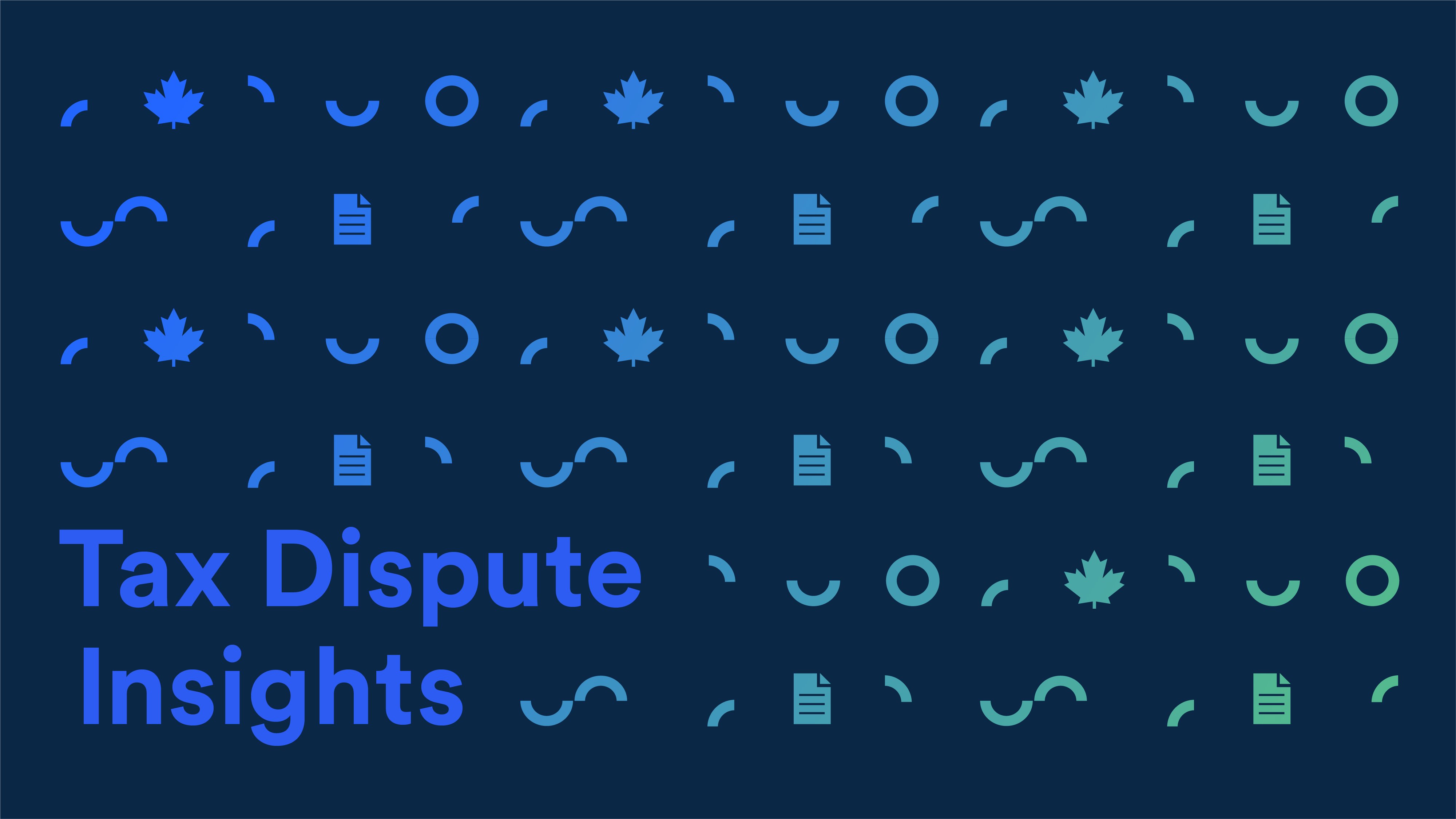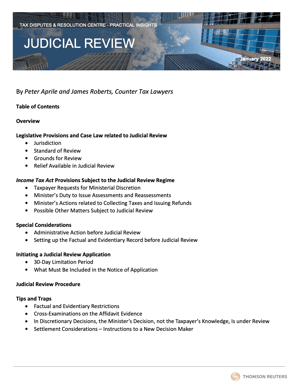
*Thomson Reuters regards the authors as individuals with expertise in tax and litigation. Thomson Reuters has published five Practical Insight chapters on different tax controversy topics, which Counter partners have written. This content originally appeared in one of those Practical Insights chapters.*
In the Income Tax Act ("ITA"), Parliament has given the Minister of National Revenue ("Minister") the following powers: (1) assess, reassess, and collect tax; (2) investigate taxpayers; (3) consider cancelling interest or penalties or providing other substantive relief; and (4) administer the Minister’s policies and procedures. The Minister created the Canada Revenue Agency (CRA) to carry out the Minister’s powers and duties under the ITA. However, under the rule of law, the Minister’s exercise of powers, through CRA, is subject to the Federal Court’s judicial review. The extent of the Federal Court’s review, and the deference the Federal Court affords to the Minister, will vary depending on the nature of ministerial power under review.
Judicial Review & Tax: Jurisdiction and the Courts
Jurisdiction
The Federal Courts Act, at ss. 18(1), gives the Federal Court jurisdiction to provide relief against the Minister and CRA. However, s. 18.5 of the Federal Courts Act limits the Federal Court's jurisdiction to tax matters for which the ITA does not provide a specific appeal procedure.
In other words, if the ITA or any other legislation sets out an appeal procedure for certain disputes, the Federal Court does not have jurisdiction over those types of disputes. As a result, in tax matters, the Federal Court's jurisdiction is limited to ensuring that the Minister, through CRA, carried out the Minister's powers and duties under the ITA. The Federal Court does not have jurisdiction to determine the correctness of an assessment or reassessment of tax or penalties under the ITA.
“…in tax matters, the Federal Court's jurisdiction is limited to ensuring that the Minister, through CRA, carried out the Minister's powers and duties under the ITA.”
Federal Courts Act
Subsection 18(1) of the Federal Courts Act provides the Federal Court with “exclusive original jurisdiction” to review and provide relief from the decisions or actions of federal boards, commissions, and other tribunals. In particular, ss. 18(1) provides that the Federal Court has the jurisdiction:
- to issue an injunction, writ of certiorari, writ of prohibition, writ of mandamus or writ of quo warranto, or grant declaratory relief, against any federal board, commission or other tribunal; and
- to hear and determine any application or other proceeding for relief in the nature of relief contemplated by paragraph (a), including any proceeding brought against the Attorney General of Canada, to obtain relief against a federal board, commission or other tribunal.1

The phrase “federal board, commission or other tribunal” is a defined term in the Federal Courts Act. Specifically, s. 2 of the Federal Courts Act defines federal board, commission or other tribunal as "any body, person or persons having, exercising or purporting to exercise jurisdiction or powers conferred by or under an Act of Parliament".2 The ITA is an Act of Parliament act, and, therefore, when CRA exercises its jurisdiction and powers under the ITA, CRA is a "federal board, commission or other tribunal" under the Federal Courts Act.3
The Federal Court’s jurisdiction extends to all federal boards, commissions, and other tribunals except those specifically identified in s. 28 of the Federal Courts Act. Jurisdiction over the federal boards, commissions, and other tribunals specifically identified in s. 28 of the Federal Courts Act rests with the Federal Court of Appeal. The Minister and CRA are not specifically identified in s. 28 of the Federal Courts Act, and, therefore, the Federal Court (as opposed to the Federal Court of Appeal) has jurisdiction over CRA's exercise of powers under the ITA.
However, the Federal Court’s jurisdiction over CRA's exercise of its powers is not absolute. Section 18.5 of the Federal Courts Act sets out that the Federal Court does not have jurisdiction over matters for which “an Act of Parliament expressly provides for an appeal to” various courts, including the Tax Court of Canada and the Federal Court of Appeal.4
Stated simply, where the ITA has established an appeal procedure to the Tax Court or the Federal Court of Appeal for a specific dispute, the Tax Court or Federal Court of Appeal, as the case may be, has exclusive jurisdiction over the dispute. In these circumstances, the Federal Court’s jurisdiction is limited to all other disputes arising out of CRA’s exercise of its powers under the ITA. Under s. 18.5, the Federal Court will strike out any application for judicial review if the taxpayer has a right—and an obligation—under the ITA to dispute the tax matter in the Tax Court.5

Tax Court of Canada Act
Subsection 12(1) of the Tax Court of Canada Act [TCCA]6 provides that the Tax Court of Canada “has exclusive original jurisdiction to hear and determine references and appeals ... on matters arising under the ... Income Tax Act [and other acts]... when references or appeals to the Court are provided for in those Acts”. Moreover, ss. 12(3) provides the Tax Court with the same “exclusive original jurisdiction to hear and determine questions referred to it under ... section 173 or 174 of the Income Tax Act”.
In these circumstances, the TCCA establishes that the Tax Court, not the Federal Court, has jurisdiction over (1) all tax disputes for which the ITA sets out an appeal procedure, and (2) references under ss. 173 and 174 of the ITA.
Appeal Procedure under the ITA
The ITA, at s. 169, sets out that taxpayers must appeal to the Tax Court of Canada to dispute an assessment or reassessment. Also, ss. 173 and 174 of the ITA provide that the Tax Court has jurisdiction to hear questions of law; fact or mixed law; and fact related to assessments, reassessments, and proposed assessments. Stated simply, any dispute related to the correctness of an assessment or reassessment falls within the Tax Court’s jurisdiction. The correctness of the assessment includes disputes related to tax, the imposition of penalties, and the effective Interest date.
Subsection 172(3) of the ITA provides that a taxpayer must appeal directly to the Federal Court of Appeal to dispute the (1) CRA’s refusal to register the taxpayer as a charity, or (2) CRA’s revocation of a taxpayer’s charitable registration.

The Federal Court has jurisdiction over all other tax disputes.
The most common tax disputes for which the Federal Court has jurisdiction are judicial review determinations related to (1) whether CRA exercised its discretion properly when making discretionary decisions, and (2) whether CRA complied with its obligations under the ITA.
However, the only limit on the Federal Court’s jurisdiction is whether some other appeal or dispute process exists to address the specific tax matter. In Minister of National Revenue and Canada Revenue Agency v. JP Morgan Asset Management (Canada) Inc.,7 after the Federal Court of Appeal conducted an extensive analysis related to the Federal Court’s jurisdiction over tax matters, the Federal Court of Appeal held that “it is unwise at this point to delineate for all time the circumstances in the tax area in which a judicial review may be brought. This should be left for development, case-by-case, on the basis of the above principles”.
Citations
1 Federal Courts Act, R.S.C. 1985, c. F-7, ss. 18(1) [FCA].
2 FCA, ss. 2(1), “federal board, commission or other tribunal”.
3 Bruno v. Canada, [1999] 4 C.T.C. 37, para. 16.
4 FCA, s. 18.5.
5 Minister of National Revenue v. JP Morgan Asset Management (Canada) Inc., 2013 FCA 250, para. 66 [JP Morgan].
6 R.S.C. 1985 c. T-2.
7 JP Morgan, supra note 5, para. 97.

.jpg?width=120&name=Counter%20Tax%20Litigators%20Logo%20Stacked%20(MidnightBlue%20on%20White).jpg)





.png?width=499&height=299&name=CRA%20Disputes_Management_Board_First_Conversation%20(Sphere%201%20Purple).png)


.png?width=400&height=400&name=CT-How_Can_We_Help-22_july_NewGraphic_b(small).png)